People
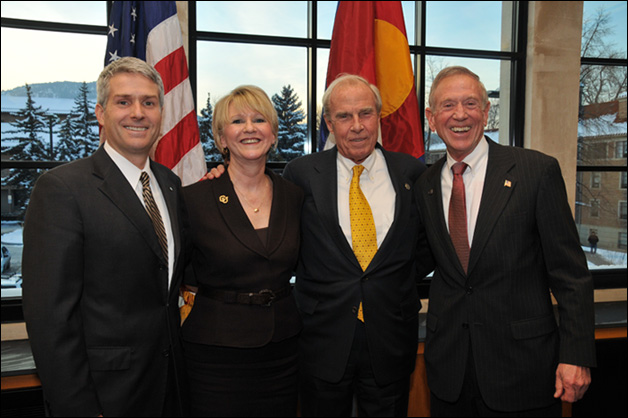
Photo: Casey A. Cass/University of Colorado |
Making it official
CU President Bruce D. Benson greets the three members of the Board of Regents who were sworn in Tuesday, Jan. 11, at the Center for Community on the Boulder campus. From left, Michael Carrigan, Sue Sharkey, Benson and Steve Bosley. Following November's elections, Carrigan and Bosley are returning incumbents; Sharkey is new to the board, which met for its winter retreat last weekend (see story here). The Regents' next meeting is Feb. 22-23 in Boulder.
|
|

Tabrizi named sustainability director for Boulder campus
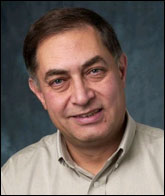 |
| Tabrizi |
Moe Tabrizi has been named director of campus sustainability for the University of Colorado at Boulder in an effort to enhance the campus' greening vision.
Tabrizi, who was CU-Boulder's energy conservation officer, will continue to work in collaboration with the CU Environmental Center, Housing and Dining Services and CU Student Government to further CU's many campus sustainability initiatives.
"As a university, we've already made large strides in achieving goals in sustainability," said Frank Bruno, vice chancellor for administration. "In order to get beyond what we've already achieved, there will be a need for greater collaboration and innovative ideas. Elevating Moe's current position will help to facilitate and coordinate these efforts."
As CU-Boulder's first sustainability director, Tabrizi is charged with the task of meeting the "Greening the Government" Governor's Energy Orders, as well as campus initiatives that include:
- Reduce energy consumption by 20 percent by 2012
- Reduce water consumption by 10 percent by 2012
- Reduce petroleum use by 25 percent by 2012
- Reduce paper use by 20 percent by 2012
- Utilize energy efficient and sustainable design standards on all new construction and applicable renovation projects. All such projects shall seek to meet or exceed LEED Gold Certification.
CU-Boulder recently was awarded the Association for the Advancement of Sustainability in Higher Education's Sustainability Tracking, Assessment and Rating System, or STARS, gold rating. The gold rating is the first to be awarded to a college campus. With more than 230 colleges and universities registered with STARS, this rating accurately compares colleges and universities around the nation, and is a key measurement of CU's national leadership on sustainability issues.
Besides moving the campus forward on many goals and initiatives, Tabrizi will continue in his role as the assistant director for engineering in the department of planning, design and construction.

Professor explores what influences voters
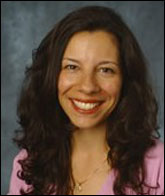 |
| Moses |
Advocates of any particular political bent might want to heed Michele Moses' research on the defeat of Colorado's Amendment 46 in 2008. In her just-published report, Moses exposes what led Coloradans to defeat the "Colorado Civil Rights Initiative," which would have purportedly prohibited "discrimination or preferential treatment in public employment, public education and public contracting."
In "Investigating the Defeat of Colorado's Amendment 46: An Analysis of the Trends and Principal Factors Influencing Voter Behaviors," Moses and her research team concluded that voters' attitudes and behaviors, media coverage of the amendment and campaign leaders' perceptions indicate that advocates should take a proactive role in educating the public about ballot initiatives and the language they put forward.
"Amendment 46 was one in a series of state ballot initiatives that have used the direct democratic process available in 24 states to allow voters to make policy. These initiatives often target policies designed to increase equality of educational opportunity. This education-policy-by-ballot-initiative phenomenon needs to be examined closely to make sure that the interests of minorities are not trampled," said Moses, who is associate professor in educational foundations, policy and practice within the School of Education at the University of Colorado at Boulder.
Preceding Colorado's vote, three other states (California, Michigan and Washington) enacted similar amendments. Coloradans, in contrast, voted against Amendment 46, keeping equal opportunity programs alive in the state. What Moses and her team of researchers discovered, however, is that the small margin of defeat for Amendment 46 (fewer than 40,000 votes) actually reflected voter confusion, which prevented it from being defeated by a much wider margin.
The majority of voters contacted for her research claimed that they favored equal opportunity, yet many of them voted yes on Amendment 46, mistakenly thinking that a yes vote was a vote FOR maintaining equal opportunity policies, when the opposite was true.
In order for voters to cast meaningful votes, Moses said, these five recommendations emerged based on her study results:
- Write ballot initiatives clearly, clarifying the intent, meaning and consequences of the law.
- Educate voters and the general public about the intent, meaning and consequences of the law.
- Utilize one primary spokesperson who provides information to the media.
- Begin education and advocacy efforts well before petition signatures are collected to get the initiative on the ballot.
- Plan for both traditional grassroots and door-to-door education efforts and use new media to communicate messages to the public.
Moses' research centers on education policy issues related to equality of educational opportunity and social justice, such as affirmative action. She is the author of "Embracing Race: Why We Need Race-Conscious Education Policy" (Teachers College Press, 2002), and is the winner of the American Educational Studies Association Critics' Choice Award and the American Educational Research Association's Early Career Award.

Women's science award goes to CU professor for first time
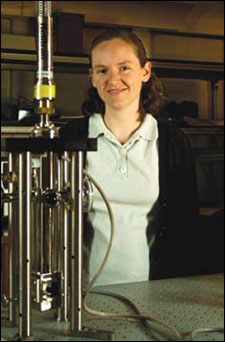 |
| Regal |
Assistant Professor Cindy Regal recently was awarded the University of Colorado's first Clare Boothe Luce Professorship Award.
The Clare Boothe Luce Award is designed to "encourage women to enter, study, graduate and teach in science, mathematics and engineering." The $645,000 award is expected to fund Regal's academic teaching and research pursuits for the next five years. Regal joined the physics faculty at CU-Boulder in January 2010, teaching an electronics course for undergraduate physics majors. She also runs her own lab as part of the Joint Institute for Laboratory Astrophysics, a renowned research institute that partners with the National Institute of Standards and Technology and specializes in atomic, molecular and optical physics.
"I am grateful to the Henry Luce Foundation for their generous support of my work, which is for me both work and fun," Regal said. "The foundation actually helped me in an important time in my undergraduate studies, and I am excited they will support me again in this crucial stage of my career, in both my teaching and research."
Established in 1973, the award was created by Clare Boothe Luce – the widow of Henry R. Luce – a playwright, journalist, U.S. Ambassador to Italy and the first woman elected to Congress from Connecticut. According to the foundation's website, "Since its first grants in 1989, the Clare Boothe Luce Program has become the single most significant source of private support for women in science, mathematics and engineering."
Regal earned her Ph.D. in physics from CU. Her doctoral thesis earned top honors from the Hertz Foundation and the American Physical Society. Following her Ph.D. work, Regal was a Millikan Postdoctoral Fellow at the California Institute of Technology. During her undergraduate career, Regal had received a Clare Boothe Luce scholarship.
Regal's main research interest is quantum systems of interacting atoms, photons and phonons.

Boulder professor awarded fellowship for physics work
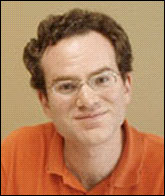 |
| Hermele |
Michael Hermele, a University of Colorado at Boulder assistant professor of physics, recently was awarded a prestigious fellowship for Science and Engineering from the David and Lucille Packard Foundation.
According to the foundation, the Packard Fellowship was established "to allow the nation's most promising professors to pursue science and engineering research early in their careers with few funding restrictions and limited paperwork requirements."
"I am very excited to receive this remarkably generous award from the David and Lucile Packard Foundation," Hermele said. "This will give me great flexibility to pursue interesting physics ideas wherever they lead."
Hermele's work focuses on theoretical condensed matter physics. "I am interested in systems of many quantum particles, in solid state materials and in ultracold atomic gases. These systems can form phases of matter where the effects of quantum mechanics are manifest on macroscopic scales," Hermele said.
The $875,000 fellowship will fund his research over the next five years. Each year, 100 applicants across 50 schools are nominated for the fellowship. This year only 17 fellows were selected. As a Packard Fellow, Hermele joins CU physics professors John Price, Leo Radzihovsky, Anton Andreev and Shijie Zhong, who have earned the fellowship in previous years.
For more information about the Packard Foundation and the 2010 fellowship awards, see the foundation's web site at www.packard.org.

Dropping names...
 |
| Von Dassanowsky |
Robert von Dassanowsky, University of Colorado at Colorado Springs professor of German and film studies, has been named a 2011 Taft Lecturer as part of the University of Cincinnati's distinguished lecture series program, sponsored by the Charles Phelps Taft Research Center. The honor, given to the "most accomplished scholars in the humanities and social sciences worldwide," has been invited to lead a student workshop on the "Image of Nazism in Cinema" on Feb. 23, and will present his campus-wide Taft Lecture on "New Austrian Cinema: A Non-Exceptional Exception" at the Center on Feb. 24. His collection of critical essays on New Austrian Cinema, co-edited with Oliver C. Speck of Virginia Commonwealth University, will be published by Berghahn Books this month. ... William Crouch, director of extended studies at the Beth-El College of Nursing and Health Sciences at the University of Colorado at Colorado Springs, recently joined the Memorial Health System Foundation Board. He is a retired cardiothoracic surgeon and also serves on the boards of AspenPointe and Peak Vista.
Want to suggest a colleague — or yourself — for People? Please e-mail information to Jay.Dedrick@cu.edu

|